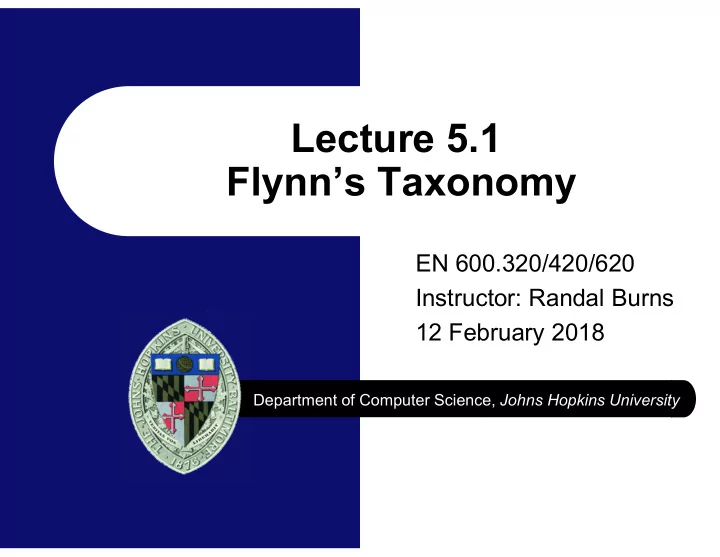

Lecture 5.1 Flynn’s Taxonomy EN 600.320/420/620 Instructor: Randal Burns 12 February 2018 Department of Computer Science, Johns Hopkins University
Why do I care about architecture? What ’ s my machine? – What do I need to know about the processors and memory architecture? How can I program it? – Different classes of machines mandate different tools The interaction of architecture and programming environment places many constraints on how best to solve a parallel computing problem Lecture 7: Parallel Architectures
Flynn ’ s Taxonomy Characterize machines by number of instruction streams and data streams – Defined in 1972. Still common practice. – A little too restrictive, but a starting place SISD: single instruction, single data SIMD: single instruction, multiple data MISD: multiple instruction, single data – Irrelevant. No such machines. MIMD: multiple instruction, multiple data Lecture 7: Parallel Architectures
SISD Single instruction, single data The von Neumann architecture – Implements a universal Turing machine – Conforms to serial algorithmic analysis From http://arstechnica.com/paedia/c/ cpu/part-1/cpu1-1.html Lecture 7: Parallel Architectures
SIMD: Single Instruction, Multiple Data Single control stream – All processors operating in lock step – Fine-grained parallelism without inter-process communication Examples – Intel vector processors – GPU stream processor Not the whole card From http://arstechnica.com/paedia/c/c pu/part-1/cpu1-1.html Lecture 7: Parallel Architectures
MIMD: Multiple Instructions, Multiple Data Most the machines we are interested in – Multi-core, SMP, Clusters, ccNUMA, etc. Flynn’s taxonomy not so useful – Must further divide the world – By architectural features and programming model Lecture 7: Parallel Architectures
Recommend
More recommend